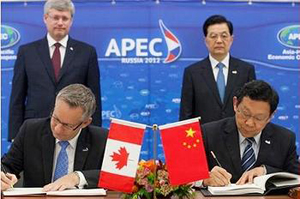
The Harper government has officially ratified a controversial trade deal with China, it announced today.
The Canada-China Foreign Investment Promotion and Protection Agreement will come into effect on Oct. 1, according to a press release from the Ministry of Foreign Affairs Trade and Development.
Since its 2012 signing in Vladivostok, Russia, the deal has been subject to controversy, with opposition members calling it a "flawed" agreement.
In a news release, International Trade Minister Ed Fast said the deal will "protect" Canadian business interests in China.
Others, such as Osgoode law professor and investment treaty expert Gus Van Harten, have argued that it will hurt Canadians by giving too much control over resources to Chinese companies, many of them state-owned.
'This is so disappointing': Hupacasath rep
The Hupacasath First Nation on Vancouver Island launched a failed challenge to stop the agreement from coming into effect on the basis Ottawa did not consult with the nation before signing the pact.
The court decision is up for appeal and a decision is expected soon, but the nation's Brenda Sayers said she now fears there may be no recourse.
She criticized the government and Minister Fast for not allowing the band's case to go through the court system before ratifying the deal.
"Ed Fast has said himself a few times that it was a matter before the courts," Sayers said. "This is so disappointing."
The federal New Democrats have argued the deal will place Canada at the whims of Chinese business for 31 years, and in the past have demanded the government abandon the deal. ![]()
Read more: Federal Politics














Tyee Commenting Guidelines
Comments that violate guidelines risk being deleted, and violations may result in a temporary or permanent user ban. Maintain the spirit of good conversation to stay in the discussion.
*Please note The Tyee is not a forum for spreading misinformation about COVID-19, denying its existence or minimizing its risk to public health.
Do:
Do not: